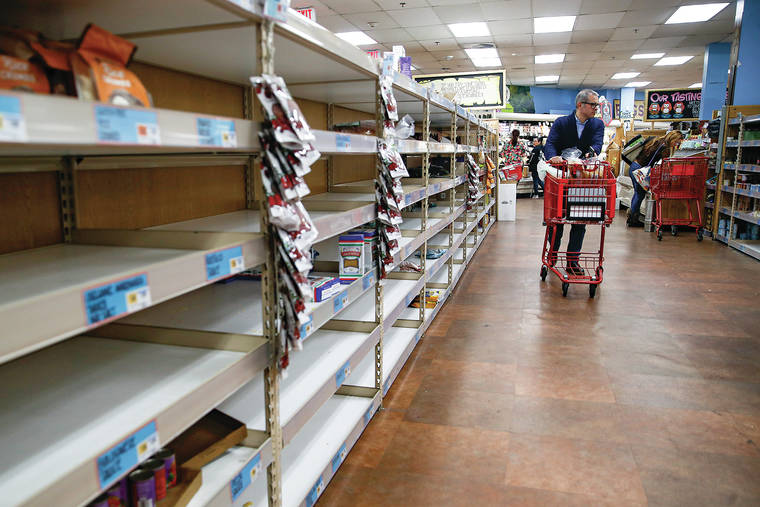Trump declares virus emergency; House passes aid package

Shoppers browse barren shelves at a supermarket Friday in Larchmont, N.Y. (AP Photo/John Minchillo)
WASHINGTON President Donald Trump on Friday declared the coronavirus pandemic a national emergency, freeing up money and resources to fight the outbreak, and then threw his support behind an aid package in Congress that is on track to provide direct relief to Americans.
WASHINGTON — President Donald Trump on Friday declared the coronavirus pandemic a national emergency, freeing up money and resources to fight the outbreak, and then threw his support behind an aid package in Congress that is on track to provide direct relief to Americans.
From the Rose Garden, Trump said, “I am officially declaring a national emergency,” unleashing as much as $50 billion for state and local governments to respond to the crisis.
ADVERTISING
Trump also announced a range of executive actions, including a new public-private partnership to expand coronavirus testing capabilities with drive-through locations, as Washington tries to subdue the new virus whose spread is roiling markets, shuttering institutions and disrupting the lives of everyday Americans.
But he denied any responsibility for delays in making testing available as his administration has come under criticism for being too slow to respond.
Trump said, “I don’t take responsibility at all” for the slow rollout of testing.
As the House prepared to vote late Friday, Speaker Nancy Pelosi trumpeted the hard-fought package that will provide free testing, sick pay for workers, enhanced unemployment benefits and bolstered food programs.
“We did what we said we were going to do: Put families first,” said Pelosi, flanked by Democratic lawmakers, including many freshmen. The House passed the bill after midnight on a bipartisan vote, 363-40. It now goes to the Senate.
Trump’s tweet of approval instilled fresh energy in the package, all but ensuring that wary Republicans would join with a robust vote.
“I fully support H.R. 6201: Families First CoronaVirus Response Act,” Trump wrote.
“I encourage all Republicans and Democrats to come together and VOTE YES!” He added, “Look forward to signing the final Bill, ASAP!”
The crush of late-day activity capped a tumultuous week in Washington as the fast-moving virus left ordinary Americans suddenly navigating self-quarantines, school closures and a changed way of life.
The White House was under enormous pressure, dealing with the crisis on multiple fronts as it encroached ever closer on the president.
Trump has been known to flout public health advice — and was eagerly shaking hands during the more than hour-long afternoon event — but acknowledged he “most likely” will be tested soon after exposures to individuals who have tested positive for the virus. The White House physician indicated later his interactions were low-risk and testing is not necessary.
Still, Trump said officials don’t want people taking the test unless they have certain symptoms. “We don’t want people without symptoms to go and do that test,” Trump said, adding, “It’s totally unnecessary.”
Additionally, Trump took a number of other actions to bolster energy markets, ease the financial burden for Americans with student loans and give medical professionals additional “flexibility” in treating patients during the public health crisis.
“Through a very collective action and shared sacrifice, national determination, we will overcome the threat of the virus,” Trump said.
Central to the aid package from Congress, which builds on an emergency $8.3 billion measure approved last week, are the free testing, sick pay and family leave provisions.
Providing sick pay for workers is a crucial element of federal efforts to stop the rapid spread of the infection. Officials warn that the nation’s healthcare system could quickly become overwhelmed with gravely sick patients, as suddenly happened in Italy, one of the countries hardest hit by the virus.
The ability to ensure paychecks will keep flowing — for people self-quarantining or caring for others — can help assure Americans they will not fall into financial hardship. The legislation also offers three months of paid family and medical leave. Small and mid-sized employers will be reimbursed through tax credits.
Pelosi negotiated the deal with Treasury Secretary Steven Mnuchin in days of around-the-clock negotiations with cross-town phone calls, even as Trump was speaking at the White House.
Hopes for swift passage stalled as talks dragged and Trump dismissed it during as “not doing enough.” Republicans were reluctant to come on board without his backing, according to a person unauthorized to discuss the talks and granted anonymity.
Ahead of Trump’s news conference, Pelosi delivered her own statement from the speaker’s balcony at the Capitol, imploring Trump’s party to “put families first” by backing the effort to provide Americans with relief.
Voting in the Senate is not yet set, with senators out of town for the weekend. But Senate Leader Mitch McConnell canceled a plan recess week and senators were scheduled to return Monday. He said he expects most senators will want to “act swiftly.”
Both Mnuchin and Pelosi, who said she did not speak directly to Trump during the negotiations, promised a third coronavirus package will follow soon, with more aggressive steps to boost the U.S. economy, which economists fear has already slipped into recession.
The financial markets closed on an upswing after one of the worst nosedives since the 1987 downturn.
For most people, the new coronavirus causes only mild or moderate symptoms, such as fever and cough.


